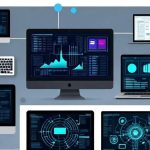AI for Smart Cities: The Future of Urban Living
AI for Smart Cities refers to the integration of artificial intelligence technologies into urban infrastructures to enhance the quality of life for residents, optimize resource usage, and improve overall efficiency in city management.
This concept is increasingly vital as cities around the globe face challenges like population growth, traffic congestion, and environmental sustainability. By leveraging AI, cities can become more responsive, adaptive, and sustainable.
Understanding AI for Smart Cities
At its core, AI for Smart Cities encompasses various applications of artificial intelligence, including machine learning, data analytics, and IoT (Internet of Things). These technologies work together to gather and analyze data, which can inform decision-making and improve urban services.
- Machine Learning: Algorithms that learn from data and can predict outcomes based on historical patterns.
- Data Analytics: The process of examining raw data to draw conclusions and support decision-making.
- IoT: Devices connected to the internet that collect and share data, enhancing connectivity and information flow.
Key Areas of Application
Traffic Management
AI plays a significant role in managing urban traffic systems. For instance, cities can use AI to analyze traffic patterns in real-time, allowing for dynamic traffic signal adjustments that reduce congestion.
Example: In Barcelona, AI algorithms analyze traffic data to optimize traffic light timings, resulting in shorter travel times and reduced emissions.
Public Safety
AI technologies enhance urban security by analyzing data from surveillance cameras and social media to predict and respond to crimes effectively.
Example: In Chicago, AI systems have been implemented to analyze crime data and predict where crimes are likely to occur, enabling police to allocate resources more effectively.
Energy Efficiency
Smart cities leverage AI to manage energy use efficiently, optimizing lighting, heating, and cooling systems based on real-time data.
Example: In San Diego, smart streetlights equipped with sensors adjust brightness based on pedestrian and vehicle presence, significantly reducing energy consumption.
Waste Management
AI technologies help optimize waste collection routes and schedules, ensuring efficient use of resources and reducing carbon footprints.
Example: In Stockholm, AI-driven waste management systems analyze data from smart bins to determine when they need to be emptied, enhancing operational efficiency.
Practical Applications of AI for Smart Cities
Integrating AI into urban environments requires careful planning and execution. Here are some practical applications:
- Smart Parking Solutions: AI can help drivers find available parking spaces using real-time data.
- Citizen Engagement Platforms: AI chatbots can provide residents with instant information about city services and events.
- Environmental Monitoring: AI systems can monitor air quality and noise levels, providing data for policy adjustments.
- Healthcare Services: AI can optimize the allocation of healthcare resources in urban areas.
Challenges and Considerations
While AI for Smart Cities presents numerous benefits, it also comes with challenges:
- Data Privacy: The collection of personal data raises concerns about privacy and data security.
- Inclusivity: Ensuring that AI solutions are accessible and beneficial to all citizens is crucial.
- Infrastructure Costs: Implementing AI technologies can require significant investment in infrastructure and training.
Related Concepts
Several concepts are closely related to AI for Smart Cities, including:
- Smart Infrastructure: The physical and digital systems that support smart city initiatives.
- Sustainability: The practice of maintaining resources to meet current needs without compromising future generations.
- Urban Analytics: The analysis of urban data to drive informed decision-making.
Conclusion: The Future of Urban Living with AI
AI for Smart Cities is not just a trend; it is the future of urban living. As cities continue to evolve, the integration of AI technologies will be crucial in addressing the challenges of modern urban life. By understanding and implementing these technologies, urban planners, students, and professionals can contribute to more efficient, sustainable, and livable cities.
As you explore the potential of AI for your community, consider how you can engage with local initiatives, advocate for smart solutions, and think critically about the role of technology in shaping our cities.









